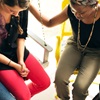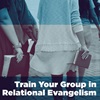The words he was greeted with on Sunday morning hit him like a brick, "You've got to do something about Kathy, She's driving us all crazy!" Tony had been leading a small group for about a year, but recently, because of the growth of their church, they have gained a few new members. Kathy was one of those people.
At first, the group was really glad Kathy had joined the group, but now it was becoming obvious that she just didn't fit in with the rest of the group. Kathy was recently divorced and had not been in a church since high school. She had come to the church mainly because of the small group ministry and thought the group environment would be a good way to deal with some of her life issues. The problem came when her problems seemed to take over the majority of the group discussion and people were getting tired of "helping Kathy."
Put yourself in Tony's shoes…what would you do? Perhaps the first thing to do is put yourself in Kathy's shoes. What does Kathy need? Is there a way for Tony to minister to his group and at the same time help Kathy move deeper in her spiritual journey?
Compassion
When you look at Jesus' life and ministry, one thing that consistently characterizes His ministry is compassion. Jesus cared. When Zaccheus was struggling to see Christ, Jesus' response was "I'm coming to your house." Don't you think that Zaccheus qualified as an EGR (extra grace required)? Most of us would have told the little guy to get lost, or just ignored him, hoping he'd go away. Jesus did neither. He included him in His life.
I shudder at the thought of how many times a Zaccheus has shown up at a small group I've been a part of "trying to see Jesus" and instead of including them, we turned a cold shoulder and hoped they would go away. Eventually…almost always, they did. What wonderful opportunities for ministry we have missed because we didn't want someone to spoil our "good thing" with all their problems.
A Level Playing field
Probably one of the most distinct differences between churches that make a difference in the lives of difficult people and those that don't is a level playing field. What I mean by this is that some churches voice the fact that "We all have problems; we all are sinners; we all have difficult lives." Churches that help people with problems are the churches that see the function of a biblical community as "Doing life together."
Several months ago, I was with a group of people when the topic of my new church came up. One of the women there said "I'd like to come to your church, but you wouldn't want me…I'm one of those hard cases!" The more I think about that, the more I realize how many times we as "church people" come across with the attitude that we have everything all figured out and "you are welcome if you'll just get your act together." We have all been a "hard case" at one time or another.
Drawing the Line
Where do we draw the line between helping people and letting them move on? How do we know whether to spend extra time helping a difficult person or refer them to someone who can help them more?
Is this person causing division in our group? If so, perhaps the best way to approach the situation is to confront them gently, reminding them of the purpose of the group. Point out that their behavior in the group environment has drawn the group away from becoming a healthy, growing community. Be firm, but loving, offering them another chance.
Are this person's problems emotional or psychological, requiring the help of a professional? Unless you are trained in counseling or psychology, most small group leaders are not equipped to deal with the deep emotional problems that many will bring to the small group. Small groups are often attractive to people with tangled emotions because many are simply looking for someone to listen to them. Don't be afraid to approach the person with the option of seeing a professional counselor. After all, we want them to get the help they need.
Is the problem I have with this person legitimate or is it a conflict of personalities? Is my problem with this person that they are not like me? Many small group conflicts boil down to the fact that we don't take time to understand one-another. We are all created differently and for that reason, we rub each other the wrong way sometimes and get on each others nerves. We've got to understand that God's intent in creating us all differently was so we could balance each other's weaknesses, not work against one-another. Insisting that everyone be like me would be nothing short of arrogant.
Can we, as a group, openly and honestly partner with this person and love them through their hurts? The atmosphere we try to promote at our church is an environment where we partner with hurting people to help them make Christ the center of their lives. I don't think there is a better environment to do this than the small group. Small groups provide the opportunity for a small number of people to invest in one-another's lives and do life together. As we partner with one-another in open, honest relationships, trust is built, walls are torn down, and lives are changed. Never underestimate the power of grace!
The Group Covenant
In my earliest years of doing small groups, I didn't understand the importance of a group covenant. Now I feel it is one of the most important things we can do as a group because it sets the tone for the group environment. One of the things we chose to do is to word the covenant (which we call a group commitment) in such a way that rather than the individual committing to the group, the group makes a commitment to the individual.
Here's what it looks like:
Community Group Commitment—CenterPointe Church
Name of Individual or Couple: _____________________________
As members of YOUR community group, we promise to:
Pray for the needs of you and your family
Protect your privacy and keep confidential things said in this group meeting
Support you in times of need or difficulty
Participate as often as possible in the activities of this group.
Encourage you as you make Christ the center of your life and relationships.
Group Members:
Name: Phone Number(s): E-mail:
The idea is that it lets people know that we are concerned about them as individuals, and that we have a mutual commitment to one-another to to lift each other up in times of difficulty. It puts us all in the same boat, levels the playing field, and helps community to exist even in the midst of difficulty. This only happens when grace is predominant over our own level of comfort.
What if…your small group was known as a place of grace where you commit to one another and journey together through life, regardless of the potholes in the road. I believe the life-change you would see would be nothing short of miraculous. After all, that is what God does best!









